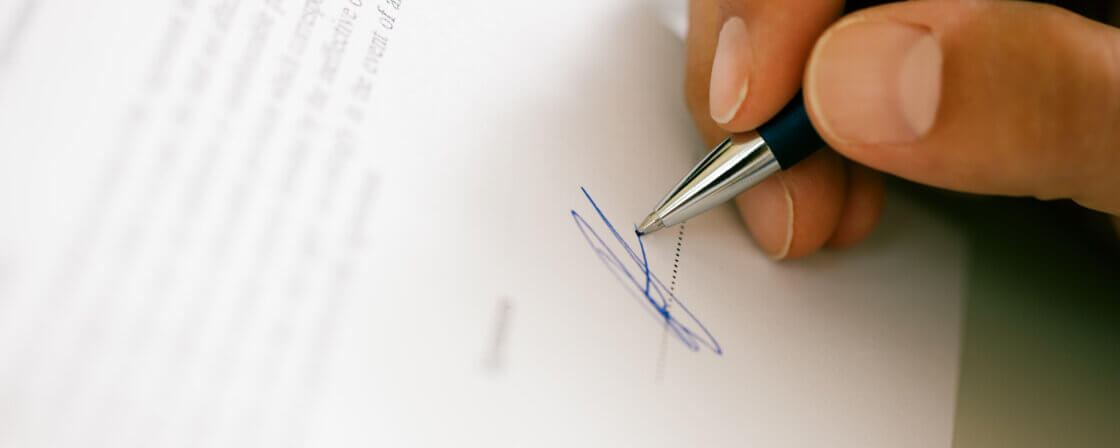What is signature verification and what is it for
Signature verification, also popularly known as “legalization”, is an official confirmation that a person has actually signed a document in his or her own handwriting. It is therefore not a verification of the content of the document, but only a verification of the identity of the person signing the document.
In practice, a certified signature is often required for important legal transactions – for example, the transfer of real estate, the execution of a power of attorney or the owner’s consent to a legal transaction. The purpose is to prevent fraud and misuse of someone else’s identity.
Some documents will not be accepted by public authorities without a certified signature – but only if this is expressly required by law (for example, when applying for entry in the Land Register or when granting a power of attorney for representation in proceedings. Therefore, if the law requires official verification of the signature, a mere handwritten signature is not sufficient – it must be officially certified.
Signature verification (so-called legalization) is regulated in the Act on Notaries and their Activities and also in the Act on Authentication. This legislation sets out who can verify a signature, what the procedure is and what conditions must be met. The purpose of official authentication is to ensure legal certainty that a particular person has actually expressed his or her will by signing a given document.
Where to verify the signature
There are several places to verify your signature. The most common ways people use are:
- Czech POINT at the post office – it is available in almost every municipality and it is the most common and cheapest option.
- Notary – notary verification is suitable for more complex legal transactions or if you need a notarial record.
- City or municipal office.
- Lawyer – he can verify signatures on documents if it is related to the provision of legal services, for example on a contract he has prepared or reviewed for a client,
- A representative office abroad – if you are outside the Czech Republic, this is where you need to go.
If you are not sure where to verify a signature in your area, just look for the nearest Czech POINT. You can find it not only at post offices, but also at municipal offices, libraries or branches of the Chamber of Commerce.
How to verify a signature
The process of signature verification is simple at first glance, but it has a few clearly defined rules that must be followed. First, you must bring a valid form of identification, i.e. an ID card or passport, so that the official can verify that you are indeed the person named on the document. You will then present the document you need to sign.
The official will then identify you , check your documents and confirm that you have signed the document in your own handwriting. Finally, they will attach an official clause with a stamp and signature, making your signature official.
There are two ways of verification:
The first is the standard way, i.e. signing directly in front of the official. This is the most common option used by most people. The person signing must have proof of identity and will sign the document directly in front of the official. The official confirms that the signature was made in his/her presence, affixes a stamp and a verification clause. Simply put: the official must see that you are signing.
The second option allowed by the legislation is called a declaration of authenticity of signature. In this case, the person does not re-sign in front of the official, but orally declares that the signature on the document is their own. In doing so, he/she transfers the responsibility for the authenticity of the signature to himself/herself. The official verifies the identity of the person, attaches a verification clause and thereby confirms that a particular person has made such a declaration. This procedure is used less frequently, usually in cases where the document has already been signed earlier (e.g. in a lawyer’s office) and the signatory subsequently appears only to confirm the authenticity of his signature.
The signature cannot be verified if the person does not prove his or her identity, is not fully competent, suspects that he or she was forced to sign, the document is incomplete or incomprehensible, or is written in a language that the verifier does not understand.
Tip for article
Tip: A power of attorney is a very useful tool that can come in handy when selling a vehicle, picking up mail, dealing with the authorities, or re-writing your utility bills. Learn how to prepare one.
Verification of signature at the post office vs. at a notary vs. at a lawyer
Each place where a signature can be verified has its advantages and disadvantages. It depends primarily on the document you are signing, whether you just need a formal confirmation of the authenticity of the signature or also legal certainty about the content of the document itself.
Verification of the signature at the post office, i.e. via Czech POINT, is the fastest and most accessible way. This service is provided by most post offices and municipal offices across the country, so it is not a problem to use it practically anywhere. The price is fixed – it is 30 CZK per signature. However, it should be remembered that the official at the post office only verifies the authenticity of the signature, not the content of the document. Therefore, he does not examine whether the text of the contract or power of attorney is legally correct and is not responsible for it.
Another option is to have the signature verified by a notary. A notary provides other legal services in addition to the verification itself, for example, he can draw up a notarial deed, which has a higher probative value than an ordinary document. Notarisation is therefore particularly suitable for real estate transfer agreements, inheritance matters or other important legal transactions where certainty and formal accuracy are required.
A specific option is the verification of the signature by a lawyer. A lawyer can verify the signature on documents that he has prepared or checked with you. The advantage is legal certainty – the lawyer is responsible for the accuracy of the service when providing it and in case of error is liable for damages caused by defective legal advice. This level of control is not provided by Czech POINT or the Post Office because their staff do not examine the content of the documents and are not responsible for it.
Online signature verification
Online signature verification has become increasingly popular in recent years. Thanks to digitalisation and the European eIDAS regulation, documents can be signed electronically via:
- Qualified Electronic Signature (QES),
- data box,
- eID, eDES, eData IDs, eDES, electronic identity verification services (e.g. BankID or eObčanka).
Online signature verification has the same legal weight as a signature on paper if it is done in a qualified manner. It is particularly useful for concluding contracts remotely or when communicating with authorities.
Wondering if signature verification is possible at home? Yes, in some cases you can sign a document electronically from home. However, you must have a certificate or an active data box. For paper documents, you need to physically go to the post office, the office or a lawyer.
Tip for article
Tip: Entering into a reservation agreement is a standard step before buying a property. However, it is not worth rushing the signing of the contract. Why discuss it at home and not rush anything?
Price of signature verification and how long it takes
The price of signature verification is determined by the Decree on Administrative Fees. At Czech POINT and the post office you will pay CZK 30 for one signature, which is the same amount at municipal offices. At a notary public, the price may vary according to his tariff, but it is usually around 70 CZK per signature. With a lawyer, the verification is often part of the preparation of the document, so it is usually included in the total price of the legal service.
The whole process takes only a few minutes. However, if you need to verify multiple signatures or more complex documents, allow a little more time.
Summary
Signature verification, called legalization, is an official confirmation that the signature on a document actually comes from a certain person whose identity has been officially verified. It does not confirm the content of the document, but it provides legal certainty and protects against identity fraud. A certified signature is required for important legal transactions, such as the transfer of real estate, the execution of a power of attorney or filing with the authorities. The signature can be verified at the post office or Czech POINT, at a notary, attorney, municipal office or embassy abroad. The process consists of identifying the person, checking the identity and attaching a verification clause with a stamp; exceptionally, a declaration of authenticity of an existing signature may also be used. The cost of authentication is usually CZK 30 per signature; it is usually slightly higher at a notary. Thanks to digitisation, verification can also be done online via qualified electronic signature, data box or tools such as BankID, which allows contracts to be concluded remotely. Signature verification is regulated by the Notary Code and the Authentication Act and provides assurance that the legal transaction is carried out by the right person.
Frequently Asked Questions
When is a certified signature required?
For example, in the case of a transfer of real estate, a power of attorney, a deed of gift or an agreement to transfer membership rights.
Can I verify my signature online?
Yes, via a qualified electronic signature or data box.
How much does it cost to verify a signature at the post office?
Standard 30 CZK per signature.
Can a lawyer verify my signature?
Yes, a lawyer can verify the authenticity of the signature on a document he prepares.
Can I verify my signature at home?
Yes, if you have an electronic signature or a data box.




